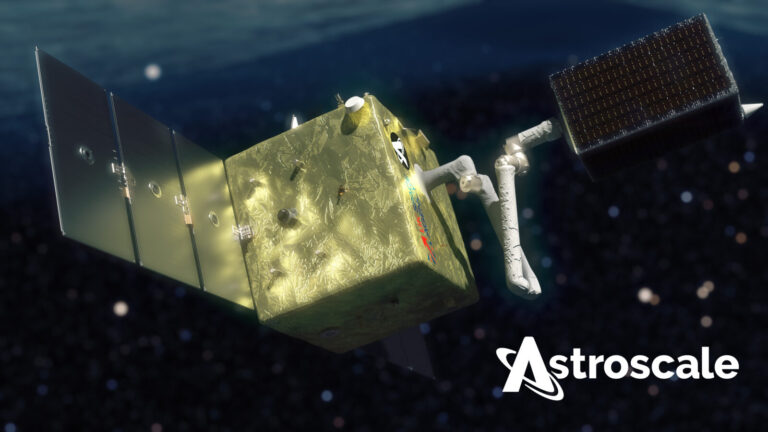Harwell, Oxford, UK, Tuesday 7th March 2023 – Astroscale Ltd. (“Astroscale UK”), the UK & Europe subsidiary of Astroscale Holdings Inc. (“Astroscale”), the market leader in satellite servicing and long-term orbital sustainability across all orbits, reveals how its Active Debris Removal (ADR) servicer can help secure the economic and environmental future of space, through the UK’s first national mission to remove space debris.
The UK Government has a strategic priority (captured in the National Space Strategy, Sept 2021) to lead the global effort to clean up space. Astroscale has an innovative solution based on in-orbit heritage that will capitalise on world-leading technology from an industrial partnership across the breadth of the UK. The COSMIC mission – Cleaning Outer Space Mission through Innovative Capture – will harness Astroscale’s Rendezvous and Proximity Operations (RPO) and robotic debris capture capabilities to remove two defunct British satellites currently orbiting Earth by 2026.
[embedded content]
“As our reliance on satellites for everyday activity grows, the UK is leading efforts to make space more sustainable,” said Ray Fielding, Head of Sustainability and ADR Mission at the UK Space Agency. “We’re backing companies, such as Astroscale, to design innovative new missions to clear hazardous space junk. We’re also developing new capabilities to improve how we track objects in orbit, while setting new standards and working closely with international partners to ensure a safe and secure space environment for future generations.”
This animation video highlights how Astroscale’s COSMIC servicer will get the job done. Astroscale is currently working with selected industrial partners on the design of a spacecraft that will incorporate an innovative robotic arm to safely and securely capture a defunct satellite in low Earth orbit (LEO). Following capture, COSMIC will maneuver the defunct satellite out of the LEO environment and release it into a lower disposal orbit where it will burn up in Earth’s atmosphere. The COSMIC servicer will then go on to rendezvous with, capture and remove a second debris object.
“Active Debris Removal means we’re trying to grab hold of an object in space that was not designed with capture in mind,” said Sarah Cawley, Senior Project Manager for COSMIC at Astroscale. “In LEO, objects are hurtling through space at 17,000 miles [27,360 km] per hour. Our job is to design a spacecraft that can approach the unprepared satellite, analyse its behaviour and trajectory, and then maneuver to capture it safely. Our in-house engineering expertise and in-orbit heritage puts us in a leading position to turn this innovative solution into a reality and help the UK Government realise the ambition to launch a national mission to remove space debris, through national capability and partnerships.”
“Astroscale was founded in 2013 with the goal of enabling a sustainable space environment for future generations,” said Nick Shave, Managing Director of Astroscale UK. “We now offer a variety of in-orbit services across the company, providing satellite operators with robust and responsible solutions. ADR is focused on the removal of defunct satellites or unprepared debris. We are excited to draw on our mission heritage and to partner with the UK Space Agency on this mission-first for the nation. Through COSMIC, Astroscale is pushing the commercial in-orbit servicing economy forward, developing national capability, world-leading facilities and strong partnerships across the whole of the UK.”

Astroscale’s ADR programme is strengthening the UK supply and value chain. The COSMIC mission is being developed in collaboration with 10 UK-based partner companies in England, Scotland and Northern Ireland including: MDA UK, Thales Alenia Space UK, Nammo, GMV-NSL, Raytheon NORSS, Goonhilly Earth Station, Satellite Applications Catapult, Willis Towers Watson, and other advisory and industrial partners. The team combines extensive systems engineering, Guidance, Navigation and Control, mission operations and ground segment expertise.
Astroscale most recently proved its magnetic capture and RPO capability in-orbit during the ground-breaking End-of-Life Services by Astroscale-demonstration (ELSA-d) mission in 2021-2022. ELSA-d was licensed in the UK and operated from the National In-orbit Servicing Centre at Harwell – a new centre developed in partnership between Astroscale and the Satellite Applications Catapult and supported by UKRI. During the ELSA-d mission, the Astroscale operations team performed a series of complex maneuvers to align, release and capture a demonstration satellite with a servicer spacecraft using relative navigation and autonomous on-board systems.
Later this year the company’s Japanese subsidiary, Astroscale Japan Inc., will launch its ADRAS-J satellite in a step towards completing the world’s first large object debris-removal mission – Japan Aerospace Exploration Agency’s Commercial Removal of Debris Demonstration (CRD2) Project. Astroscale Japan was previously contracted as a partner for Phase I of this project, and in this mission ADRAS-J will rendezvous with and inspect a 3-tonne upper stage H-IIA rocket body. The satellite will demonstrate rendezvous, fly-around, and proximity operations, and obtain images to deliver observational data essential to a Phase II of the project, which aims to capture and deorbit a large debris object in or after Japanese fiscal year 2025.
The COSMIC debris removal servicer will be a technological evolution of Astroscale’s End-of-Life Services by Astroscale-Multi-client (ELSA-M) servicer – a commercial partnership together with the European and UK Space Agencies and OneWeb, the global satellite operator, under the Sunrise programme. The first ELSA-M servicer will be launched ahead of the UK’s Active Debris Removal mission in 2025.


 Copyright 2023 All rights reserved.
Copyright 2023 All rights reserved.